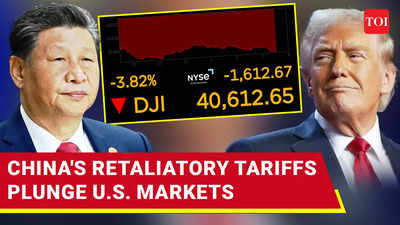- News
- Business News
- International Business News
- What critical mineral exports is China limiting amid tariff war with US?
Trending
What critical mineral exports is China limiting amid tariff war with US?
China has expanded its export restrictions on critical minerals in retaliation to US tariffs. Key materials like rare earth elements now have tighter controls, impacting high-tech industries and defence sectors globally. The move is aimed at leveraging China's dominance in the global mineral supply chain.
As a countermeasure to US tariffs imposed by President Donald Trump, China has expanded its sweeping export restrictions on strategic minerals critical to defence, clean energy, and high-tech industries.
The latest development brings out Beijing's growing willingness to weaponize its dominace over global mineral supply chains.
Rare Earths and permanent magnets
On Friday, China placed seven categories of medium and heavy rare earth elements under export control, including samarium, gadolinium, terbium, dysprosium, lutetium, scandium, and yttrium-related items.
According to the Reuters, these minerals are essential for producing high-performance permanent magnets used in defence systems, electric vehicles, and clean energy technologies.
Also read: China escalates trade war, imposes 34% duty on US imports after Trump's tariffs; files lawsuit with WTO
“Full-blown export restrictions on high-performance rare earth magnets containing dysprosium and/or terbium will hit foreign industries and defence sectors hard,” said Ryan Castilloux, founder of Adamas Intelligence. “Importers are holding their breath—no one knows where the cannons are aimed.”
China produces about 90% of the world’s refined rare earths, and the US is heavily reliant on Chinese imports.
Earlier curbs on five strategic metals
In February, shortly after the US imposed its first 10% tariff on Chinese goods, Beijing introduced export licensing requirements for tungsten, tellurium, bismuth, indium, and molybdenum. These metals are vital for electronics, clean energy, and defence technologies.
The restrictions stop short of outright bans but are narrowly targeted. Some products, such as molybdenum, remain exportable under specific conditions.
Battery and gallium processing
In January, China proposed restrictions on the export of advanced battery and mineral processing technologies, including those used to refine lithium and gallium. These proposals, still pending final approval, signal China’s intent to curb foreign access to critical know-how.
One Chinese company reportedly ceased exports of affected products soon after the proposal surfaced.
Outright ban on antimony, gallium, and germanium to US
In December, China banned exports of antimony, gallium, and germanium to the US, in response to Washington’s tightening restrictions on China’s semiconductor sector. Though officially limited to the US, the move has disrupted global markets.
Despite export license regimes introduced earlier, shipments to major buyers like Japan, India, and South Korea were slow to resume. China mines or refines between 50% and 90% of global supply of these critical materials.
Rare Earth magnet technology also off-limits
Also in December 2023, China expanded its technology export ban to cover the production of rare earth magnets, building on previous restrictions on separation and refining technologies.
The decision impacts all countries, further specifies China’s leverage over the critical minerals sector.
Global response likely to accelerate
Friday’s announcement—part of a broader retaliation against the US raising tariffs on most Chinese goods to 54%—is expected to galvanise efforts in the West to diversify supply chains.
“This will cause European companies and governments to also think: what’s the risk of export controls hitting us next?” said Jacob Gunter of the Mercator Institute for China Studies.
According to Canada-based Mining.com, heavy rare earth elements (HREEs) are of particular concern. “There is currently only one HREE-focused operation outside of China, Myanmar, and Laos,” mentioned David Merriman of Project Blue. Even that mine, Serra Verde in Brazil, currently ships its output to China for processing.
Control over producing and refining
China controls the mining, refining, and export quotas for many strategic minerals. While rare earths are abundant in the earth’s crust, the refining process is complex and environmentally hazardous—an area where China has secured dominance.
Beijing’s ability to throttle supply via licensing, rather than outright bans, allows it to flex its muscle without completely cutting off trade—a tactic that keeps global markets in suspense.
Stay informed with the latest business news, updates on bank holidays and public holidays.
Master Value & Valuation with ET! Learn to invest smartly & decode financials. Limited seats at 33% off – Enroll now!
End of Article
FOLLOW US ON SOCIAL MEDIA


















